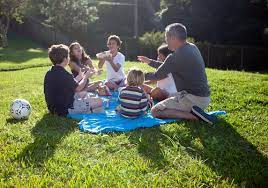Research shows that having children doesn’t make you happier.
Many parents refer to their children as “pride and joy.” However, research shows that having kids doesn’t make you happier.
Jennifer Glass, a professor of sociology at Texas at Austin and a demographer who studies how parents and well-being relate, states that most parents believe their children are very important sources of life satisfaction.
Glass explains to CNBC Make it, “But that’s no same as happiness. It’s not also the same as financial well-being.
Hence, we are not able to see the joy that having children will bring.
Being a parent is an exciting rollercoaster ride.
Research has shown that babies experience a “happiness bump” right after birth. Glass claims that this happiness tends to fade throughout one year.
The happiness levels of parents and children gradually decline after that point, with children generally becoming happier over time.
Although it’s not that parents are reluctant to bring a baby into the family, child-rearing can be difficult.
CNBC Make It host Amy Blackstone, professor of sociology, University of Maine and author of “Childfree By Choice,” says that parents’ happiness drops quickly when they learn the amount of work involved with a new baby.
Glass states that parents tend to reflect on their lives by focusing on their children’s loving, positive moments. She says, “And thank God for that because those same marvellous little creatures can put you into the abyssal of despair if something goes wrong.”
Happiness can be described as a complex concept. It includes life satisfaction, which describes how happy you are about the way you live, and well-being which describes how you feel in each moment.
Although having children can increase your happiness and quality of life, there is also a lot of responsibility and stress. It can lead to a rollercoaster ride of highs and lows throughout their parenting experience.
A study by Princeton University and Stonybrook University showed that parents and children have similar levels of life satisfaction. However, parents experience more joy and less stress than their non-parents.
Glass states that “life without children is much more stable.”
Parents deal with “constant low-level stressors.”
Glass states that parents face many low-level stressors, such as having to figure out remote learning or getting up at night to care for a sick child. Actively parenting adults tend to have higher levels of anxiety and depression.
It doesn’t mean that stress disappears when children become independent and mature. A 2019 study showed that parents who have had their children leave are happier than those who remain.
Glass says that the price of strong emotional bonds with your children is a lot of worries.
The “price” for having children has increased during the pandemic. Millions of mothers with children were forced out of the workforce by higher demands at home.
According to an American Psychological Association survey, 75% of parents of children under 18 felt they could have received more emotional support during the pandemic. 48% of parents stated that their stress levels had increased since then.
Children are costly, and Americans don’t get much help.
The main factor that influences parental happiness is money. Researchers found that having children increased happiness when financial problems were removed.
In 2015, the average cost of raising a child in the U.S. was more than $233,000 (according to the USDA’s most recent Consumer Expenditures Survey data). CNBC Make It reported that an average American family with children spends approximately $11,000 annually in direct and indirect child-care costs.
Glass also stated that the United States has a social structure that makes parenthood difficult.
In 2017, a study showed that parents in the U.S. were less happy than those in developed countries with more generous family policies such as paid parental leaves. For example, parents who give birth in Finland receive a box of baby products and 164 days of paid leave.
Blackstone states that childfree adults, which are people who have made a clear and deliberate choice not to have children, may be able to have more time, money, and freedom to pursue the things they love.
Nonparents can spend their money in ways that have been proven to increase happiness. This includes putting money towards personal growth and connecting with others.
People who choose to be childless tend to give more money to causes they care about and plan for their old age.
Blackstone states, “Because our money is not being spent raising children, many of us can save money for retirement in a way that parents might not be able.”
It’s more than just happiness.
There are many positive aspects to having a family.
Even though parents may not be able to find the moment-to-moment happiness they desire, having children gives meaning, satisfaction, and connection in their lives.
Glass states, “If we were asked to rate how important our relationships with our kids are, they would zoom up to the top,” even more than relationships with partners.
There are many nuanced reasons people have children that go beyond their happiness.
Glass says, “What a lot people remember about parenthood is the incredible highs that come with creating new lives and the outpouring love and devotion you feel for that person as well as the protection and affection you want to show that person.”



